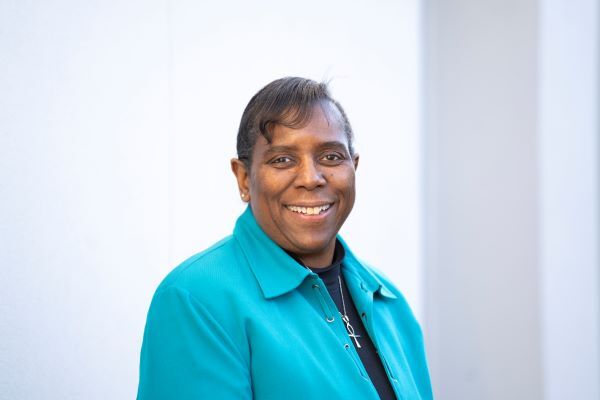Peterson promoted to associate dean of adult education at Guilford Technical Community College
Peterson promoted to associate dean of adult education at Guilford Technical Community College Yes! Weekly


Kecia Peterson Named GTCC’s Associate Dean of Adult Education
Kecia Peterson, Ed.D. named GTCC’s associate dean of adult education.

JAMESTOWN, N.C. (Jan. 9, 2024) – Kecia Peterson, Ed.D., who has served as an adjunct instructor in adult education at Guilford Technical Community College since 2021, has been named the college’s associate dean of adult education.
While serving as an adjunct instructor, Peterson taught high school equivalency preparation and human resource development courses in the High Point Detention Center. Additionally, she has taught English for speakers of other languages (ESOL).
“I am grateful for the opportunity to continue to serve GTCC in my new role as associate dean of adult education,” said Peterson. “I look forward to having a positive impact on the adult education department, and I am committed to continuing the successful path of making amazing happen.”
As the associate dean of adult education, Peterson will oversee the administration and day-to-day of all academic components of the program on the High Point campus including adult basic education, adult secondary education, and ESOL.
“Dr. Peterson brings a wealth of experience to our adult education team, including experience in teaching in K-12 schools, serving as an adult education adjunct instructor in GTCC’s ESOL and high school equivalency programs, and as a professional development facilitator for other adjunct faculty in our program,” said Claire Ricci, associate vice president of workforce and continuing education. “We are excited to have her energy and expertise in this important leadership role on our team.”
Peterson served as the CEO of Renaissance Educational Initiative, a community-based company she founded in 2013 which mentored and consulted elementary schools to help enhance academic performance, develop leadership skills, and increase confidence and self-esteem in young children.
Peterson received a doctorate in education from Capella University in Minneapolis, and a Master of Education Administration from Grand Canyon University in Phoenix. She earned a Bachelor of Science in business administration from Monmouth University in West Long Branch, New Jersey.
About Guilford Technical Community College:
Guilford Technical Community College is the fourth largest of 58 institutions in the North Carolina Community College System. GTCC serves more than 28,000 students annually from five campuses and a Small Business Center. For more information, visit gtcc.edu, Facebook, Instagram, and LinkedIn.
SDGs, Targets, and Indicators
-
SDG 4: Quality Education
- Target 4.3: By 2030, ensure equal access for all women and men to affordable and quality technical, vocational, and tertiary education, including university.
- Indicator 4.3.1: Participation rate of youth and adults in formal and non-formal education and training in the previous 12 months.
-
SDG 8: Decent Work and Economic Growth
- Target 8.6: By 2020, substantially reduce the proportion of youth not in employment, education, or training.
- Indicator 8.6.1: Proportion of youth (aged 15-24 years) not in education, employment, or training.
Analysis
The article discusses the appointment of Kecia Peterson as the associate dean of adult education at Guilford Technical Community College (GTCC). The issues highlighted in the article are related to education and workforce development.
1. Which SDGs are addressed or connected to the issues highlighted in the article?
The issues highlighted in the article are connected to SDG 4: Quality Education and SDG 8: Decent Work and Economic Growth.
2. What specific targets under those SDGs can be identified based on the article’s content?
Based on the article’s content, the specific targets identified are:
- Target 4.3: By 2030, ensure equal access for all women and men to affordable and quality technical, vocational, and tertiary education, including university.
- Target 8.6: By 2020, substantially reduce the proportion of youth not in employment, education, or training.
3. Are there any indicators mentioned or implied in the article that can be used to measure progress towards the identified targets?
Yes, there are indicators mentioned in the article that can be used to measure progress towards the identified targets:
- Indicator 4.3.1: Participation rate of youth and adults in formal and non-formal education and training in the previous 12 months.
- Indicator 8.6.1: Proportion of youth (aged 15-24 years) not in education, employment, or training.
Table: SDGs, Targets, and Indicators
| SDGs | Targets | Indicators |
|---|---|---|
| SDG 4: Quality Education | Target 4.3: By 2030, ensure equal access for all women and men to affordable and quality technical, vocational, and tertiary education, including university. | Indicator 4.3.1: Participation rate of youth and adults in formal and non-formal education and training in the previous 12 months. |
| SDG 8: Decent Work and Economic Growth | Target 8.6: By 2020, substantially reduce the proportion of youth not in employment, education, or training. | Indicator 8.6.1: Proportion of youth (aged 15-24 years) not in education, employment, or training. |
Behold! This splendid article springs forth from the wellspring of knowledge, shaped by a wondrous proprietary AI technology that delved into a vast ocean of data, illuminating the path towards the Sustainable Development Goals. Remember that all rights are reserved by SDG Investors LLC, empowering us to champion progress together.
Source: yesweekly.com

Join us, as fellow seekers of change, on a transformative journey at https://sdgtalks.ai/welcome, where you can become a member and actively contribute to shaping a brighter future.







